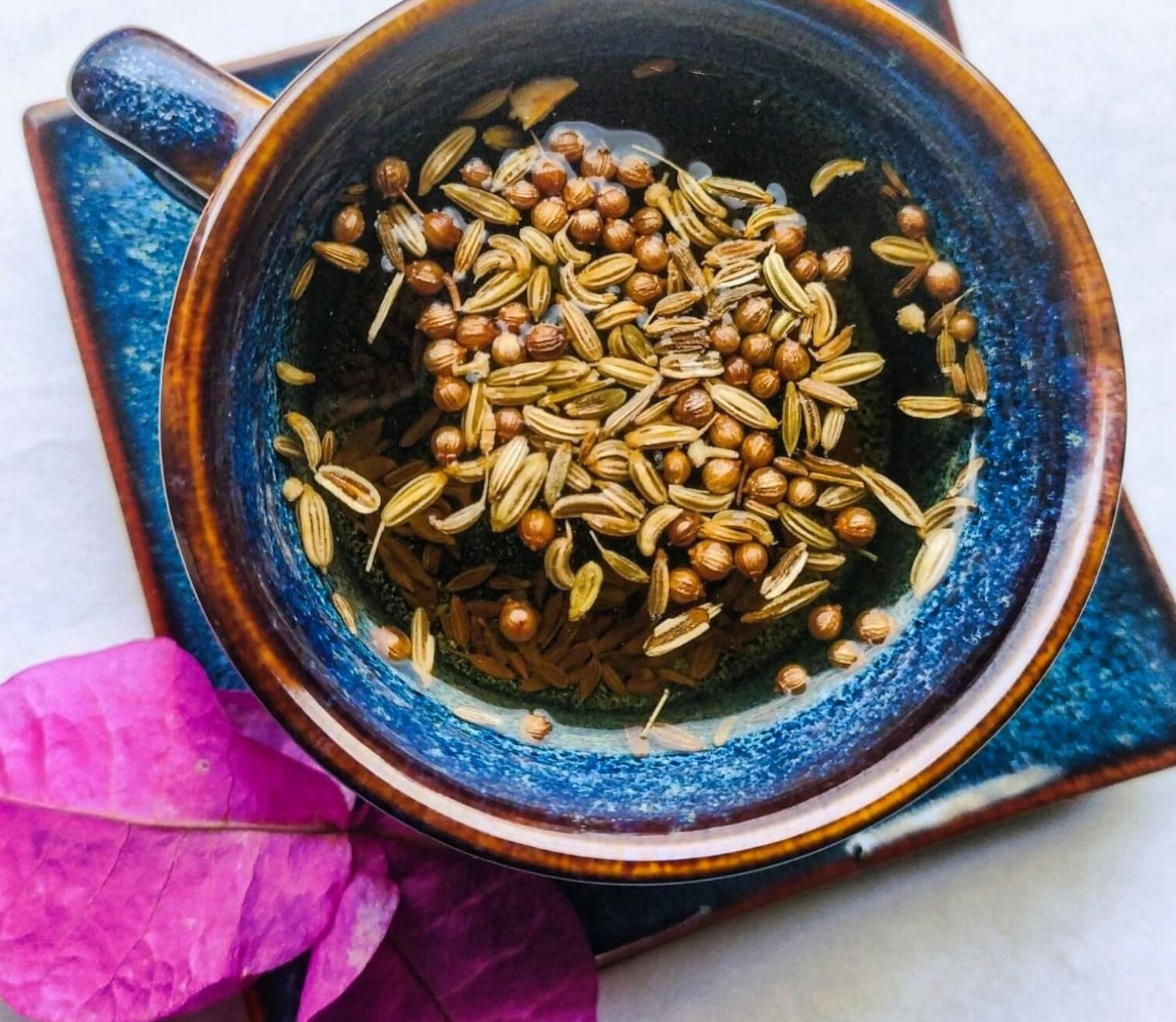5 Spices for Finding Harmony: The Ayurvedic Apothecary Hidden in Your Kitchen
While spending time at home this year, befriending my inner chef has been key to sanity. Anyone else?! Prepping and enjoying a home cooked meal is simply therapeutic. Chopping, stirring, aromas and spices truly soothe the soul. An easy way to deepen those soothing sensations is peppering your cooking with Ayurvedic wisdom. All it takes is a few common spices to elevate your foods from delicious to healing.
What is Ayurveda: A theory for finding harmony within our bodies
Before we dive into spices, let’s take a moment to talk about Ayurvedic theory and practice. Ayurveda teaches us to view the world as it relates to its elemental forces—or doshas (Vata, Pitta, and Kapha). Each of us is born with a unique combination of the three doshas, with one or two typically being dominant.
Throughout our lives, the doshas fluctuate due to factors like diet, habits, seasons and our environment. These fluctuations cause mental and physical imbalances affecting our energy levels, digestion, health, and mood. Curious about your doshas? Take this quick quiz.
Understanding our doshic constitution and current imbalances allows us to consciously make choices to cultivate harmony in our lives. See if you recognize any of these signs of personal imbalance.
Practicing Ayurveda: Spices help us find harmony
Diet is key to balancing the doshas. What we put in our bodies has direct effects on our physical health, mind, and soul. Ayurvedic wisdom turns to certain spices to heighten the benefits of fresh food and as a way to discover balance.
Spices strengthen our Agni (digestive fire) and help cleanse ama (toxins) from the body. In the digestive process, Agni decides what substances enter our cells and tissues, and which should be removed as waste. When Agni is impaired, our digestive system cannot function properly. This causes Ama (toxins) to accumulate throughout the body ultimately leading to disease.
(Yoga Veda Institute, 2020)
Ayurveda + your kitchen: stock your shelves with harmony helpers
Now, Let’s open the spice cabinet and see how to turn your kitchen into a starter Ayurvedic apothecary.
Coriander: The spice for cooling a fiery gut
When your gut feels irritable on a hot day, coriander is the go-to. The cooling properties of coriander bring balance to excess Pitta (Fire). Coriander soothes stomach spasms, reduces acidity, and alleviates inflammatory skin conditions and sunburn.
When I need to cool down with coriander, this coconut kitchari recipe is one of my favorites for lunch or dinner.
Cumin: The spice for easing sluggishness and bloatation
Sluggish and bloated days aren’t easy! Fortunately, you can call on cumin in a pinch. Cumin is rich in anti-inflammatory properties and antioxidants. The spice relieves slow digestion, assists in nutrient absorption, and lowers high blood pressure. Cumin’s benefits include balancing excess Kapha (dampness) in the body by drying up symptoms of allergies and lung congestion.
Try sprinkling dry-roasted cumin on plain yogurt with a little salt or on a simple breakfast omelette.
Fennel: The spice for settling nerves
When your nerves can’t seem to settle, turn to fennel. This aromatic spice increases sattva, or clarity of consciousness. Fennel is one of the best digestive herbs because it’s tridoshic—it brings balance to all three doshas. In action, the spice soothes the nervous system, relieves intestinal cramping, and relaxes tight muscles.
Try two of my favorite quick and easy ways to sneak fennel into your daily routine.
Add a ½ tsp to breakfast oatmeal with cinnamon, cardamom, ginger, and cooked apples.
Make Cumin, Coriander, and Fennel (CCF) Tea. Sip this Ayurvedic spice trifecta after meals to ease heartburn, hyperacidity, and bloatation.
Ginger: The spice for healing your whole system
When you’re dealing with a cold, make sure ginger is on hand to help you rest and recover. Abundant in healing properties, ginger is often called “the herbalist's best friend.” This light, pungent spice invigorates the whole system while improving circulation and reducing coldness in the body. Ginger is especially beneficial for clearing excess Kapha from the lungs and sinuses.
Try making this carrot ginger soup with red lentils, cumin, cardamom, and ghee. I love this recipe’s healing warmth and overall yum.
Turmeric: The spice for easing inflammation
When you just can’t get comfortable because everything feels a little inflamed, grab some Turmeric. The spice’s warming quality balances Kapha and Vata doshas, simultaneously its bitter taste balances Pitta. How this translates—turmeric is full of anti-inflammatory and anti-bacterial properties, and it supports colon, liver and cardiovascular health.
To feel Turmeric’s benefits, heat it and combine it with black pepper. I highly recommend sipping a grounding cup of golden milk an hour before bed to ease any discomfort that may cause insomnia.
“When diet is wrong, medicine is of no use. When diet is correct, medicine is of no need.” (Ayurvedic Proverb)
I hope these Ayurvedic tips will spice up your kitchen while supporting your wellness and health! If you are interested in learning more ways to incorporate the wisdom of Ayurveda into everyday living visit @SattvaAlchemy.
ABOUT THE AUTHOR
Shannon is a certified yoga teacher living in Hoi An. She is currently studying to become an Ayurvedic Wellness Counselor with the Yoga Veda Institute. Shannon has a passion for herbal healing. She recently started an endeavor called Sattva Alchemy, creating 100% natural soap and skincare products to soothe the skin and soul! Check out Sattva Alchemy on Instagram or Facebook @sattvaalchemy for more Ayurvedic lifestyle tips and wholesome products.




